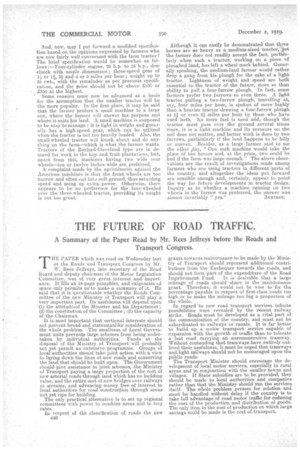• THE FUTURE OF ROAD TRAFFIC.
Page 24

If you've noticed an error in this article please click here to report it so we can fix it.
A Summary of the Paper Read by Mr. Rees Jeffreys before the Roads and Transport Congress.
THE PAPER which was read on Wednesday last at the Roads and Transport Congress by Mr. W. Rees Jeffreys, late secretary of the Road Board and deputy chairman of the Motor Legislation Committee, was of very great interest and importance. . It fills an 18-page pamphlet, and exigencies of space only permits us5to make a summary of it. He said that it is questionable whether the Roads Committee of the new Ministry of Transport will play a very important part. Its usefulness, will depend upon (1) the attitudesof the Minister and his Department ; (2) the constitution of the Committee ; (3) the capacity of the Chairman. .
It is most important that sectional interests should not prevent broad and statesmanlike consideration of the whole problem. The smallness of Local Government units preventes large schemes from being undertaken by individual authorities. Funds at the disposal of the Ministry of Transport will probably not yet permit an extensive programme. Groups of local authorities should take joint action with a view to laying down the lines of new roads and conserving the land that should be built upon. The Government should give assistance to joint schemes, the Ministry of Transport paying a large proportion of the cost of new arterial roads through land which has no building value, and the entire cost of new bridges over railways or streams, and advancing money free of interest to local authorities for road construction through areas not yet ripe for building..
The only practical alternative is to set up regional committees with power to combine areas and to levy rates. . In respect of the classification of roads the new c40 grants towards maintenance to be made by the Ministry of Transport should represent additional contributions from the Exchequer towards the roads, and should not form part of the expenditure of the Road Imprbvement Fund. It is desirable that a large mileage of roads should share in the 'maintenance grant. Therefore, it would not be wise to fix the percentage payable in respect of first-class roads too high or to make the. mileage too big a proportion of the whole.
In regard to new road transport services infinite possibilities were revealed by the recent railway strike. Roads must be developed as a vital part of the communication of the country, and must not be subordinated to railways or canals. It is far better to build up a motor transport service capable of expansion with the growth of traffic than to tolerate a had road carrying an unremunerative tramway. Without contending that tramways have entirely outlived their usefulness, it must be urged that tramways and-light railways should not be encouraged upon the public roads. The Transport Minister should encourage the development of local motor services, especially in rural areas and in conjunction with the smaller towns and villages. If State subsidies are to be provided, they should be made to local authorities and companies rather than that the Ministry should run the services itself. The whole problem presses for solution and must be handled without delay if the country is to take full advantage of road motor traffic for reducing the cost of the production and distribution of goods.. The only item in-the wet of production on which large savings could be made is the oast of transport.


























